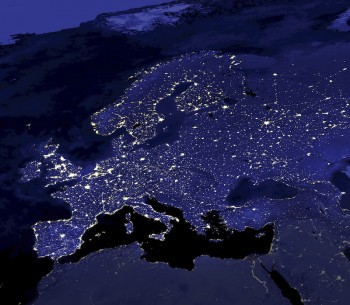Earlier this year, the European Union (EU) proposed the establishment of an “Energy Union” in order to create a smart, unified energy grid across member States. The goal of this new energy policy is to reduce dependencies on sole suppliers, allow for the free flow of energy across borders, increase efficiency, reduce energy costs and also reduce carbon output.
Although the European Commission has called for ten percent electrical grid integration over the years, it has not yet come to fruition due to misaligned goals among EU members, historic political differences, and a strong focus on green energy that has side tracked the Energy Union project.
At a time when American energy production is at an all-time high and tensions across the world are growing, many in Europe are looking to the United States for solutions to energy and infrastructure policy challenges. As such, the U.S. can—and should—be an integral partner to these European countries.
American energy production has increased drastically due to the discovery of shale fields and rise of fracturing technology. Coupled with increased efficiency standards and the significant growth of renewables, America now has energy independence within its reach. What is even more extraordinary is that these changes have enabled companies to supply energy at incredibly low prices to wholesale and retail customers. Cheap energy has directly raised the ability of American businesses to compete on the world stage while also providing much needed relief to all consumers by reducing the costs of transportation, goods and supplies, and energy bills at home.
The European Union, on the other hand, currently imports 39 percent of its natural gas and 33.5 percent of crude oil from Russia. Notably, this nation sees energy as an instrumentality of foreign policy, to be wielded and used as leverage in order to manipulate the European region and tighten its hold on the international stage. This relationship has once again become a huge challenge for millions of Europeans, causing disunion among members, volatile supply, and significant fluctuation of energy prices.
Against this backdrop, other countries in Europe and especially former Soviet satellites, still find themselves dependent upon older forms of energy such as Chernobyl era nuclear and coal plants. In contrast, other countries are producing cleaner excess energy but still have no way of transporting it to those in need. While changes are occurring—Lithuania for once has taken matters into its own hands by self-funding both a new LNG import terminal and underwater electrical cable connections to Sweden—the European Union has been far to slow to act as a whole.
The creation of a unified EU energy grid would bring drastic upgrades to energy infrastructure in the region, enabling energy to be transported efficiently, filling energy shortfalls and reducing energy costs. Europe would have greater central control over energy suppliers and reduce its dependency on Russia, perhaps turning to the United States for crude oil and natural gas imports. This would enable the U.S. to assist its allies while also gaining an economic advantage, which would ultimately help kick start the domestic energy industry once again. A connected grid means energy highways which will ultimately create a diversified energy mix where regional strengths in solar, wind and hydro can be more efficiently leveraged than is currently being done on a national level.
Last week, the non-partisan, non-profit Alliance for Innovation and Infrastructure (Aii) hosted a Capitol Hill panel discussion on European energy and infrastructure challenges and their impact on U.S policy. The event featured industry experts and high-ranking European diplomats who all underscored the role America can and should play in alleviating the continent’s energy infrastructure challenges.
A European Energy Union would certainly be in the best interest for America as it would provide an avenue for economic growth, bolster the domestic energy industry, increase American influence abroad, and ultimately assist our democratic allies to complete their integration into a free Europe.






